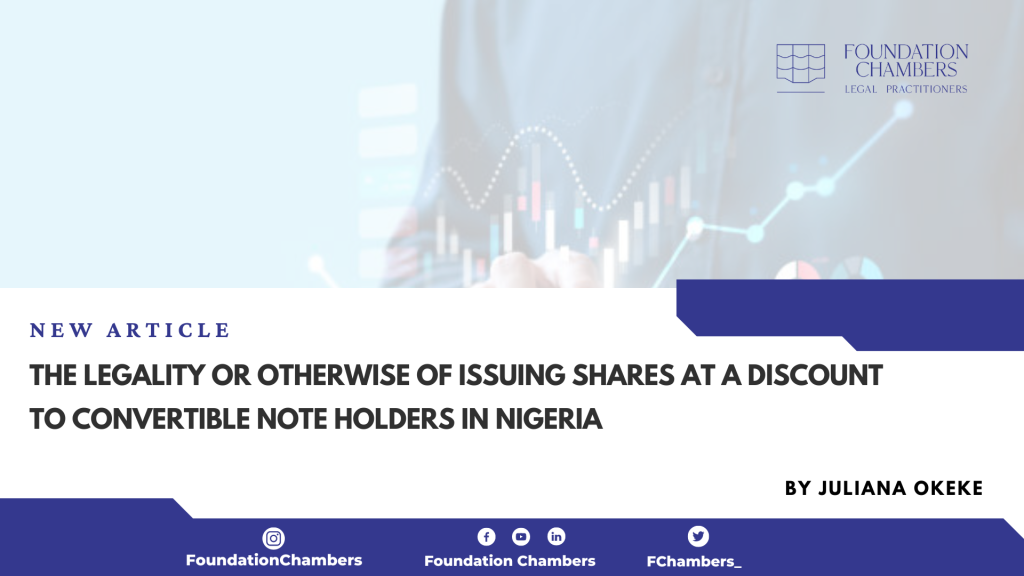1. Introduction
Financing is the lifeblood of every business, and where there are no funds or there is inadequate funding, businesses struggle to attain reasonable growth, and some may even go into liquidation. It is therefore important that businesses acquire external financing to commence operations or scale up. Businesses also need to source funds that will not attract heavy interest rates to enable them to survive the first stage of operations and attain stability.
In Nigeria, Debt financing, particularly loans from banks, is the most popular source of business financing, notwithstanding the unfavourably high interest rates offered by Banks, which tend to impact businesses negatively. Consequently, in a bid to enhance capital structures and reduce reliance on borrowing from banks as a major source of funding, corporations have started exploring other sources of funding such as convertible notes, private equity, venture capitalists, public offers, mergers and acquisitions, and corporate bonds, amongst others.
This article will discuss one of the funding options, which is convertible notes, the basic terms contained in the convertible note agreement, and whether, under the provisions of the Companies and Allied Matters Act of 2020[1], shares can be issued at a discount to investors when their notes are converted into equity.
2.Convertible Note
A convertible note, also known as a convertible bond or convertible debt, is defined by Black’s Law Dictionary as “a bond, debenture, or note that, under certain conditions and at certain times, may be converted into stock by the holder[2]. It is a short-term debt financing option that has, over the years, become a popular method of raising capital for entrepreneurs, particularly start-ups.
One of the advantages of using convertible notes by start-ups is that they can obtain funds to run the first stages of their business without having to establish the valuation of their business, as is required when equity is directly sold. This enables the business to grow and attain stability before the enterprise value of its shares is determined.
It is structured with a provision that allows investors to convert the principal sum and the interest that accrued on the said principal into equity when a specified event takes place. The principal sum with the accrued interest is converted into equity upon the closing of a financing round. The conversion into equity affords the early-stage investors the opportunity to become members or shareholders of the start-up, unlike in the case of bank loans, where borrowers are expected by contract and under the law to repay the loan upon maturity.
A convertible note is distinct from other notes because of the presence of Conversion Discount and Valuation Cap clauses in the document. Either of the terms or both can be in the convertible note document. They are usually provided to safeguard the interests of investors at the end of a financing round.
The Valuation Cap Clause is provided in the convertible note agreement to reward early-stage investors for taking on the risk of investing in the business when it was still in its early stages. It gives early-stage investors an edge by setting the maximum value of the business when a round of financing closes. It also sets the maximum price at which convertible notes will be converted into equity, i.e., what early-stage investors will pay for the equity of the business regardless of the price per share on the next round of equity financing.
The Conversion Discount Clause, on the other hand, makes it possible for early-stage investors to purchase the shares of a company at a price lower than the actual price. Where this clause is contained in a convertible note agreement, the early-stage investor will be entitled to convert its notes and the accrued interests into equity at a discount or at a price lower than what later investors will pay for the shares of the same company. This clause serves to reward early-stage investors for taking the risk of investing in a company even before its value is ascertained.
Other clauses provided in the Convertible Note Agreement include interest rates, maturity dates, and issuance dates.
3. Issuing shares at a discount to holders of convertible notes
One of the major advantages of convertible notes for early-stage investors is their ability to purchase equity at a price lower than the valuation price. This is made possible by the provision of a Valuation Cap and Conversion Discount in the convertible note agreement.
In Nigeria, under the old Companies and Allied Matters Act of 1990[3], an investor with a convertible note agreement that has a conversion discount clause will be entitled to be issued shares at a discount. However, this is no longer possible as of 2020 with the coming into force of the new Companies and Allied Matters Act, 2020 (hereinafter referred to as “the Act”). This is because Section 146 of the Act expressly prohibits the issuance of shares at a discount. Section 146 of the Act[4] provides as follows:
“It is unlawful for a company to issue shares at a discount.”
Given the above, companies will be prevented from issuing shares at a discount, irrespective of whether they have entered into Convertible Note Agreements with investors. Although parties are bound by the terms of the agreement they enter into and are under obligation to perform their responsibilities under the contract, where the agreement is contrary to any provisions of the law or contrary to public policy, the agreement is illegal, void, and unenforceable. This means that investors may not be able to enforce their Convertible Note Agreements because of the Act’s coming into force. If this is the case, companies could find it difficult to comply with their obligations to early-stage investors to offer shares at a discounted rate, given that such an obligation may be seen as illegal.
In the case of NIDB v. ROLISCO (NIG) LTD[5], the Court held that parties are bound by the terms of their contract. The Court said:
“It is worthy of note that parties to any contract are bound by the terms of their contract. The terms of the contract between the parties were agreed upon by them to govern their transaction. By the doctrine of the sanctity of contract, each of the parties is required to stick to the terms and carry out their duties under the contract.”
However, where the terms of the agreement are for the performance of an act that is unlawful, such an agreement is illegal, void, and unenforceable. The Supreme Court of Nigeria has also affirmed this in the case of Ajayi v. Total (Nig.) Plc[6], where it held that illegal contracts are unenforceable:
“A contract is illegal where the consideration or the promise involves doing something illegal or contrary to public policy or if the intention of the parties in making the contract is illegal or contrary to public policy; in other words, an illegal contract is void and cannot be the foundation of any legal right. Also, all transactions from it are void.”
The effect of the above is that agreements that are contrary to the provisions of the law or contrary to public policy are illegal, void, and unenforceable. The Courts will not hesitate to declare such agreements illegal when they are brought before them. Therefore, Convertible Note Agreements that have conversion discount clauses are illegal and unenforceable in Nigeria since the coming into force of the Act forbids the issuance of shares at a discount. Thus, parties cannot, by their agreement, seek to authorize the issuance of shares at a discount because the same has been declared illegal by the Act.
The prohibition on issuing shares at a discount will discourage investors from investing in companies through convertible notes. However, parties can explore alternatives for making convertible notes attractive to investors who intend to fund the start-ups through notes by granting preferred or special rights to holders of the Convertible Notes, as provided for under Section 144 of the Act. The special rights will give holders of the Convertible Notes rights such as the right to a yearly dividend or the right to a dividend higher than that of later investors.
Parties can explore the provisions of Section 144 of the Act to encourage investment in start-ups using convertible notes. Section 144 of the Act[7] provides that:
“Without prejudice to any special rights previously conferred on the holders of existing shares or classes of shares, any share in a company may be issued with such preferred, deferred, or other special rights or restrictions, whether with regard to dividend, return of capital, or otherwise, as the company may determine by ordinary resolution.“
In this instance, a company (start-up) can, by ordinary resolution, agree to assign special rights to the shares of early-stage investors after the conversion of the notes into equity. Where this resolution has been made, the parties can, by agreement, assign preferred rights to shares of the early-stage investors upon conversion of the notes into equity. For instance, parties can, by agreement, state that upon conversion of the convertible note into equity, the shares of the early-stage investors shall be entitled to a five percent dividend above other shares upon declaration of dividend. The agreement can also state that dividends shall always be declared in favor of the shares of early-stage investors in every financial year.
4. Conclusion
The high interest rate on loans from banks and the need to reduce reliance on loans from banks as a way of funding businesses have led to the exploration of other sources of corporate financing. Convertible notes have over the years become one of the major debt financing options available for entrepreneurs, particularly start-ups, because of their benefits to both start-ups and early-stage investors. It enables start-ups to get funds to run their businesses even before the value of the business is ascertained. It also allows investors to purchase the equity of the company at a lower price than later investors will pay.
However, given the provisions of Section 146 of the Companies and Allied Matters Act, 2020, it appears that the issuance of shares at a discount to holders of convertible notes will no longer be possible as the Section has explicitly prohibited such issuance. To ameliorate the effect that Section 146 of the Act will have on investors and start-ups, start-ups can, by ordinary resolution, agree to assign special rights to the shares of the early-stage investors upon issuance in line with the provision of Section 144 of the Act. The convertible note agreement would contain rights that would make holders of the Convertible Note preferred shareholders, such as the right to a yearly dividend and the right to a higher dividend than that of later investors.
DISCLAIMER– Please note that the information provided herein is for general informational purposes only and should not be construed as professional advice. The content is not intended to create, and receipt of it does not constitute, a lawyer-client relationship or any other professional-client relationship. We are available to offer expert legal advice to address readers’ situations and needs.
[1] The extant law regulating the registration, management, and winding-up of businesses in Nigeria It came into effect on August 7, 2020
[2] Black’s Law Dictionary (6th Edition) at page 333.
[3] 1990, Laws of the Federation of Nigeria, 2004.
[4] Companies and Allied Matters Act, 2020
[5] (2022) LPELR-58518(CA), (Pp 13–14 Paras F–C). See also the case of ABC (Transport Company) Ltd. v. Miss Bunmi Omotoye (2019) LPELR 47829 (SC).
[6] (2013) 15 NWLR Pt. 1378 15 NWLR pp. 441, para. E.
[7] Companies and Allied Matters Act, 2020


